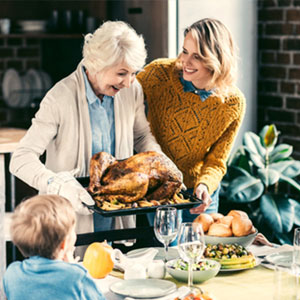Danger Signs When Visiting Elderly Loved Ones
This holiday season may be the first in more than a year that some family members are able to visit in person with their elderly parents or other aging relatives. This may also be the first time they will see, up-close, age-related decline in their loved one’s physical or mental health.
Decline can occur quickly and one thing is for sure: if you have only had telephone or FaceTime, Skype, or Zoom contact during the challenging months of COVID-19, you may not be aware how adept seniors can be at hiding or downplaying any new or worsening health issues they may be having. Even under the best of circumstances, holiday visits may be the only or one of few opportunities all year long to see aging loved ones in person to observe changes or declines.
It is very important to pay extra attention to some of the warning signs that point to your loved ones needing extra help at home … or that it may be time to talk about transitioning to an environment where they can receive more care and supervision. Here are some key observations:
Weight Loss
Possible causes of weight loss can include cancer, dementia, or depression. For seniors who are experiencing lower energy levels or fatigue, it may be challenging to shop for groceries, prepare meals, and clean up afterward. Some elders may consider this too much work for someone who lives and eats alone. Certain meds can cause a loss of appetite or change the way foods taste.
Balance and Mobility Changes
Watch the way your loved one moves and walks. Changes in gait or obvious pain can be a sign of joint, muscle, or neurological problems. A reluctance to walk is cause for concern. If unsteady when walking, seniors are at risk of falling. According to the Centers for Disease Control and Prevention (CDC), more than 300,000 older people are hospitalized each year for fall-related injuries like hip fractures.
Mood and Behavior Fluctuations
Has your loved one withdrawn from social activities? Has there been a change in sleep patterns? Are once loved hobbies no longer of interest? Notice changes in personal hygiene and in the upkeep of the home. Observe if the same clothing is being worn repeatedly or if clothing is soiled. Do you detect confusion or agitation in your loved one? Sometimes this can be a sign of a physical disorder like a urinary tract infection (UTI) which is prevalent in seniors and easily treated with antibiotics.
Change in the Home
If your usually fastidious and tidy loved one is now residing in a cluttered home with unopened mail, something may be amiss. During your visit, make it a priority to walk throughout the home to gauge whether the home is being kept up to your loved one’s usual standards. Scorched cookware can indicate food that was forgotten in the oven or on the stovetop. Moldy food in the refrigerator is another indicator. A clothes hamper that is overflowing with laundry may mean your loved one doesn’t have the strength and/or desire to do the laundry. Check for expiration dates on prescriptions and over-the-counter medications. Try to determine if medications are being taken as prescribed.
What to do if your fears are realized?
If weight loss is evident, talk to your relatives about your concerns and schedule a doctor’s appointment to address the issue. If you notice changes in walking or balance, call the doctor for an appointment to discuss options for keeping them safe and mobile. Pain management, in-home care, mobility aids are discussion points. If fears of falling are not addressed, seniors can withdraw and stop participating in daily activities in and out of the home. If the home and basic living tasks are being neglected, discuss options for getting the help your loved one needs.
While you may not want to risk putting a damper on the holiday festivities, you should take this opportunity to address any warning signs you observe. Collect the information you may need during your visits, such as physicians’ names and contact information, insurance, and names and phone numbers of friends nearby.
Discuss your concerns with your loved one with compassion and sensitivity. Suggest making an appointment with the doctor for a complete health assessment. The results of this evaluation will help you to determine together what next steps may be necessary to stay healthy, safe, and happy.
If you have questions about decluttering or transitioning to a senior living community email Marie LeBlanc or call her at 617-513-0433.

